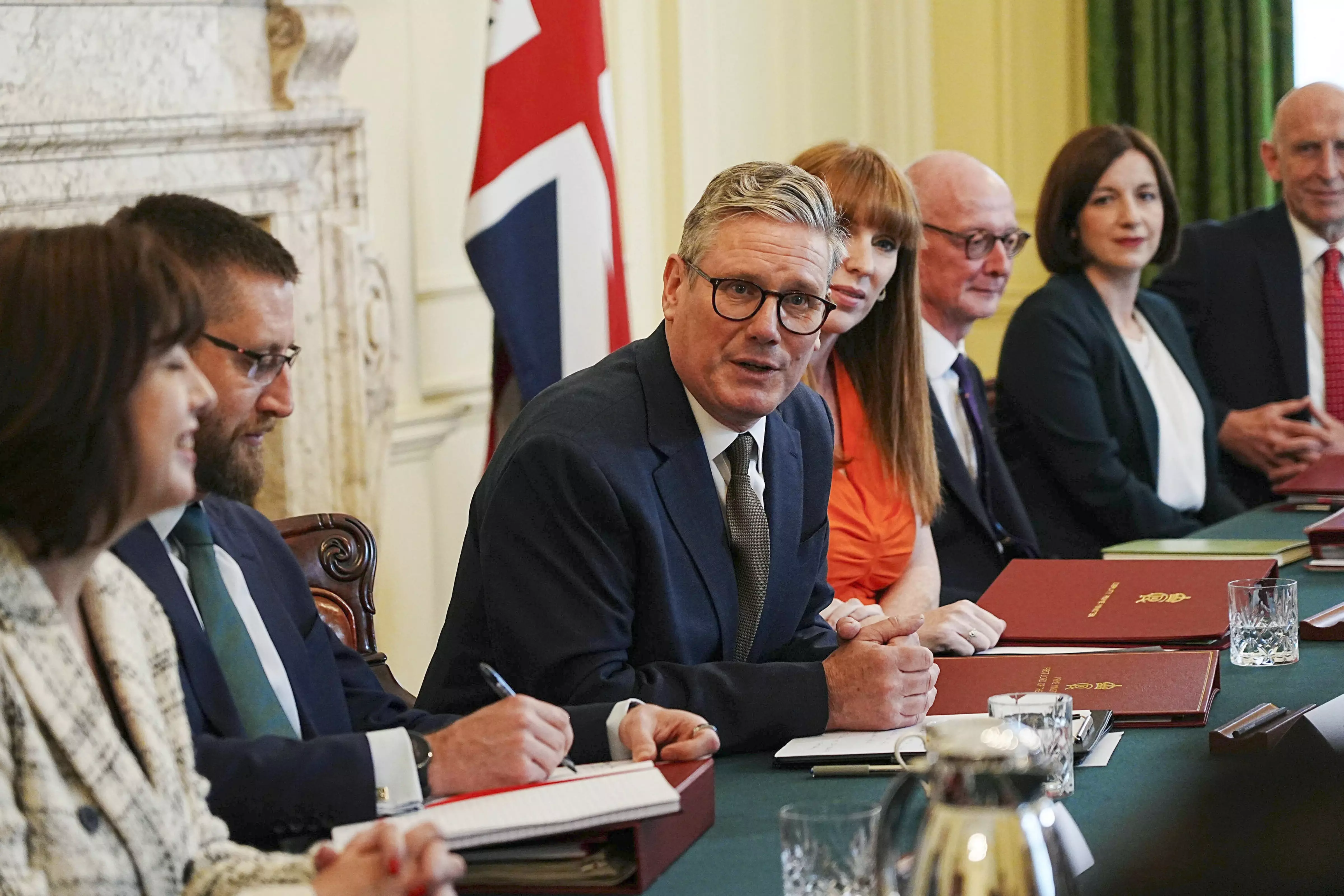
- Home
- India
- World
- Premium
- THE FEDERAL SPECIAL
- Analysis
- States
- Perspective
- Videos
- Sports
- Education
- Entertainment
- Elections
- Features
- Health
- Business
- Series
- In memoriam: Sheikh Mujibur Rahman
- Bishnoi's Men
- NEET TANGLE
- Economy Series
- Earth Day
- Kashmir’s Frozen Turbulence
- India@75
- The legend of Ramjanmabhoomi
- Liberalisation@30
- How to tame a dragon
- Celebrating biodiversity
- Farm Matters
- 50 days of solitude
- Bringing Migrants Home
- Budget 2020
- Jharkhand Votes
- The Federal Investigates
- The Federal Impact
- Vanishing Sand
- Gandhi @ 150
- Andhra Today
- Field report
- Operation Gulmarg
- Pandemic @1 Mn in India
- The Federal Year-End
- The Zero Year
- Science
- Brand studio
- Newsletter
- Elections 2024
- Events
- Home
- IndiaIndia
- World
- Analysis
- StatesStates
- PerspectivePerspective
- VideosVideos
- Sports
- Education
- Entertainment
- ElectionsElections
- Features
- Health
- BusinessBusiness
- Premium
- Loading...
Premium - Events

x
Britain's Prime Minister Keir Starmer (centre) at his first Cabinet meeting at 10, Downing Street, London. File photo: PTI
Labour won only because people desperately needed to punish Conservative party of Boris Johnson; Reform UK got 15% vote share, signalling rise of xenophobic Right in Britain
It is easy to see in the election to office of the Labour party in Britain a departure, finally, from an ongoing rightward shift in European politics. That would be misleading.
In fact, it is possible to argue that Labour’s victory signals the growing influence of the xenophobic Right in Britain, as elsewhere in Europe.
No, this is not to suggest that Labour has suddenly ceased to be the party of progressives and idealists in the UK, and transformed, without anyone noticing, into a British version of France’s National Rally, Germany’s Alternative for Deutschland, or the party of Italian Prime Minister Georgia Meloni, the Brothers of Italy.
What has changed
Labour under its current leader, Keir Starmer, is not the dynamic force ready to recognise ongoing changes in the world, adapt and adopt whatever is best for the people at large that it was under Tony Blair.
Starmer spoke entirely in worn cliches, celebrating his victory and assuming the premiership of Britain, as if he was incapable either of fresh thought or of stringing together some sentences of his own to articulate thought that might be a decade old but still remains valid.
The Conservatives lost 251 seats they had held since the last general elections. In 170 of these seats, Reform UK, the xenophobic, new party launched by Britain’s own homegrown racist, Nigel Farage, got more votes than the losing margin for the Conservative candidate.
Except in Scotland, where consistent and unfailing efforts by the Scottish Nationalist Party to swing the pickaxe at the ground under its own feet finally met with amputative success, Labour did not get votes for being Labour. It got votes because people desperately needed to punish the party of Boris Johnson, whose charm could not offset the damage done by his lies, and of Liz Truss, whose government, the Economist had predicted, would not last longer than it would take for a head of lettuce to wilt.
Rise of the Right
Reform’s share of the vote was 15 per cent. This is not far below the vote share of Germany’s right-wing Alternative for Germany (AfD), of 15.9 per cent in the recent elections to the European Parliament.
AfD makes more news because its leaders do not hold back on their frank opinions, such as not all members of Hitler’s SS, the paramilitary stormtroopers organised as the black-shirt-wearing Schutzstaffel, were bad people.
They probably thought that if US President Donald Trump could get away with the statement that there are fine people on both sides, the sides being Black Lives matter protesters and White Supremacists opposing the protesters, including the outfit, the Proud Boys, whom Trump called upon, after the January 6 riots on the Capitol had taken its toll, to stand down.
Compared to such harking back to Nazi and racist virtue, Reform UK’s migrant bashing looks more modest.
Discontent among masses
But make no mistake, the rise of the Right in Europe and in the US is a reality.
They see white Christendom as being locked in a death struggle with people of colour and non-Christian faiths. Of course, these people are deplorably ignorant, in general, and, in particular, of the non-white origins of Christianity.
Jesus and his mother Mary were Palestinians, never mind all those thousands of paintings by Europe’s vaunted artists depicting them as white Europeans. Converts in India, Sri Lanka and Ethiopia were already struggling to understand the idea of turning the other cheek at a time when Romans were still feeding Christians to the lions.
Defendants of Christendom
Nor do they appreciate that other faiths are capable of championing the universality of human bonds, implicit in Christ’s urging to love your enemy, dumping the Old Testament’s norm of an eye for an eye and a tooth for a tooth.
Of course, supporters of the Right are not confined to misguided defendants of Christendom. Stagnant incomes, rising prices, and increasing competition for jobs that call, more and more, for education beyond the reach of the masses, spawn disaffection.
The elites are seen to gain disproportionately, turning into billionaires, even as the masses struggle to hold on to jobs outsourced abroad and slipping living standards. Animosity builds towards the elites and centrist politicians seen to be the billionaires’ stooges.
Multi-cultural Britain
A third stream feeding the rightward shift in politics is the political correctness of the centrist parties, which goads them to ignore the visible effects of mass immigration of people of colour, often steeped in cultures that are at odds with not just local culture but also norms of civilized coexistence as conventionally understood.
Right-wing parties do not ignore these cultural clashes; they propose the only solution on offer — violent rejection.
Britain is probably more successfully multi-cultural than any other major European country, even accepting a prime minister, mayors and political party leaders of immigrant backgrounds. Yet, Britons seem to be unaware of their affinity for multi-cultural coexistence, like the gentleman who realised only late in life that prose was what he spoke.
A majority voted for Brexit, and, Brexit having been accomplished, now regret it. But 15 per cent of voters swung hard to the right in the July 4 elections, helping throw the Conservatives out of power and install Labour in their place.
Silver lining
There is a silver lining, though, albeit none too bright. The Iranian elections have thrown up a president who wants to be known as a moderate. A moderate that still meets with the approval of the Guardian Council of the Islamic Revolution, no doubt.
But the direction of travel in Iran is towards liberalism, however tentative and small the steps taken might be, quite opposite to the direction of travel in Europe and the US.
When Iran, Iraq, and other more evolved parts of the Islamic world were experiencing their democratic awakening after the end of World War II, the West had conspired to crush it, because the forces of democracy in the region were supported by the Soviet Union, and local Communist parties were active participants in the political ferment.
Democracy demolished
In the Cold War battle to crush Communism, democracy got demolished. The likes of the Shah of Iran and Saddam Hussain of Iraq assumed power with the support of the West.
They massacred communists and democracy activists, and jailed those who escaped extermination. Traditional politics was gagged and hobbled. Religion then became the idiom and grammar of protest. The Islamic Revolution triumphed in Iran.
Radical strains of Islam continued to fester in the medium of repression conducive to its growth. The result was dominance, in the Islamic heartland, of the most regressive iteration of Islam that Haroun-al-Rashid, the most celebrated Caliph ever, would struggle to recognise as the faith he had presided over.
Democracy in Islamic world
The West has won the Cold War. The radical Islam it seeded now kills and maims people across Islamic countries, oppresses women, and creates revulsion against the faith in the lands to which ordinary Muslims seek to migrate.
Democracy in the Islamic world is the surest way to exorcise the faith of its puritanical radicalism, and institute an interpretation of the faith compatible with democracy, which necessarily means, among other things, equality of the genders.
In the anti-hijab protests and in the election of a moderate president, we see the glimmer of a popular will to regain democracy in Iran. This might not immediately herald a second Islamic Revolution, this time of reform, but is a welcome political tendency in contrast to the regression we see in the West, as well as an ingredient of the antidote to that malaise.
(The Federal seeks to present views and opinions from all sides of the spectrum. The information, ideas or opinions in the articles are of the author and do not reflect the views of The Federal.)
Next Story


